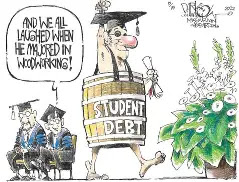Is Higher Education Worth the Price?
Is Higher Education Worth the Price?
In the documentary "Ivory Tower," a thought-provoking documentary, dives headfirst into the complex world of higher education, challenging us to reconsider its value in the 21st century. The film doesn't shy away from tough questions, dissecting the rising costs, mounting student debt, and the relevance of traditional learning models in a rapidly changing world. It's a wake-up call, urging us to look beyond the conventional wisdom and explore innovative approaches to education.
One of the most striking aspects of "Ivory Tower" is its exploration of the skyrocketing tuition fees that have made college unaffordable for many. The film highlights how universities have become increasingly focused on lavish amenities and administrative bloat, often at the expense of academic quality. As a result, students are saddled with crippling debt that can take decades to repay, casting a shadow over their prospects. The documentary also raises concerns about the relevance of traditional curricula, questioning whether they adequately prepare students for the demands of today's job market.
However, "Ivory Tower" doesn't just dwell on the problems. It also shines light on innovative educational models that are disrupting the status quo. From online learning platforms to collaborative learning environments, the film showcases how technology and creative teaching methods can make education more accessible, affordable, and relevant. It challenges us to think outside the box and consider alternative pathways to success, such as vocational training, self-directed learning, and experiential education. Ultimately, "Ivory Tower" is a call to action, urging us to reimagine higher education as a dynamic and evolving force that empowers individuals and strengthens society.
Alternatives to traditional colleges include online courses, community colleges, vocational schools, coding bootcamps, and self-directed learning. Online Courses Offered by universities or platforms like Coursera and edX provide flexibility and access to a wide range of subjects. Community Colleges: These offer affordable, two-year programs and can be a stepping stone to a four-year university. Vocational Schools focus on specific trades or skills, such as culinary arts or mechanics, providing hands-on training for direct entry into the workforce. Coding Bootcamps are Intensive programs that teach coding skills in a short amount of time, preparing graduates for tech jobs. Self-Directed Learning
With all of this in mind, are you pro-college and higher education, or
are you against it? I'm not saying that it is not a good idea to go to college,
but in the end, you must think of the overall picture. Do you want to live the
rest of your life or a lengthy amount of time in debt?








Comments
Post a Comment